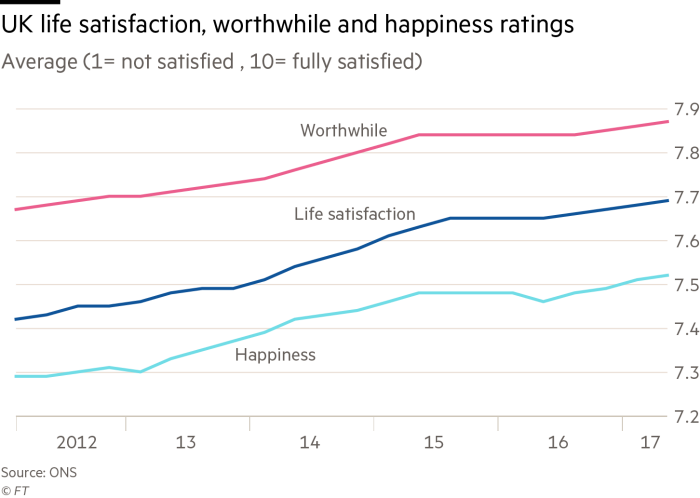Link between earnings and happiness is a tenuous one


Roula Khalaf, Editor of the FT, selects her favourite stories in this weekly newsletter.
The death of Reg Buttress late last year — just two months after he retired after 36 years working for the supermarket J Sainsbury — was sad, but not entirely unexpected. At 94, Reg had already outlived many of his contemporaries and he was starting to feel his age.
Work had been a central and important part of his life for more than 80 years. At the time of his retirement he told the BBC: “I enjoy coming to work, I always have. I’ve had a job since I was 13, I was never out of work.”
Research suggests that while our genes and personality influence about 50 per cent of how happy we feel, the balance is influenced by our health, employment and relationships.
In addition to the obvious financial rewards, for many people work also provides a sense of purpose, social status, human interaction and structure to the day. That is why people who are unemployed for more than a few months can experience real misery and unhappiness. They suffer much more than just a loss of income.
So I was not surprised to learn that with employment in the UK at record levels, official measurements of average life satisfaction and happiness ratings have reached their highest levels since 2011 — even though wages are falling in real terms.

Countless studies have tried to determine whether there is a link between how much people earn and their happiness. The consensus seems to be that the amount of income does matter, but only to a certain extent — to afford a “comfortable” lifestyle. Beyond this, happiness seems to plateau.
Yet happiness is also linked to how much people save. A recent survey by Sun Life found that the amount of household surplus monthly income seems to affect overall happiness levels. The happiest 10 per cent of people lived in households with surplus monthly income of £841 per month, about £28 per day.
So could you be happier if you spent less, and saved more? The average UK household surplus income is just under £15 per day. Reducing other household spending by £13 a day would generate enough of a surplus to put the average household in the happiest category.
How much we earn relative to our peers seems to have more of a bearing of how satisfied we are with life. Even if you have enough income to lead your definition of a nice life, knowing that your colleague is earning more than you is likely to put a dent in your happiness.

While pay rises do make us happy, these need to be continual and meaningful to have lasting impact. Look at how morale in the public sector has fallen after several years of below-inflation salary rises.
Global research shows that the happiest people tend to work between 35 and 44 hours a week in a job which has a very high fit to their personality type. Therefore, being an investment manager who works long hours, including evenings and weekends, will not enhance your happiness if you like predictable, routine tasks and want to keep reasonable hours. You might think that earning huge amounts of money will make you so happy it will compensate for the long hours. But would it really?
Some years ago, gardeners and florists were found to be the happiest occupations, whereas bankers and IT workers were found to be the least happy. And never forget the value of greater autonomy — self-employed people have also been found to have higher levels of happiness than employed workers.
Whether you love your job or get your satisfaction from activities outside work, the cumulative value of all your future income from working represents a very valuable asset — your human capital — which is derived from your resources such as time, energy, knowledge, skills, health and relationships. If you lose your job, you have not lost your human capital resources. This is a much more empowering way to think about how you earn your income.
So the best investment you can ever make, particularly if you are young, is to invest in improving your human capital. Achieving an annualised salary rise of 4 per cent throughout a 40 year working life is far more valuable than securing a £1,000 salary rise followed by 3 per cent annual increases, as shown in this chart.

Spending time and money improving your employability and earnings power should be at the top of your regular financial planning “to do” list. As well as increasing your human capital, it will also help protect you from becoming irrelevant in the face of automation and other technological developments.
But perhaps the most important thing you can do is to make sure that your lifestyle expenditure rises at a lower rate than your income. The reason why many people are not able to convert enough of their human capital into financial capital is that they get sucked into the marketing myth that to be happy you need to spend money now, rather than saving and investing it for later.
Another benefit of restraining the rate of increase in your lifestyle spending is that the amount of income you will need when you eventually stop working will be much less. If you haven’t got used to living with numerous expensive luxuries, you won’t miss them.
If you have good health, do work that you enjoy and have a handful of close personal relationships, the chances are you will be very happy indeed and live to a ripe old age.
Reg Buttress worked for the past 30 years of his life not because he needed the money. He did it because his job made him happy.
If you control your spending and save reasonable amounts of what your earn, there is a good chance you will have the same choice.
Jason Butler is an expert on financial wellbeing. His latest book, “Money Moments: Simple Steps to Financial Wellbeing”, is on sale now. Twitter: @jbthewealthman
Comments